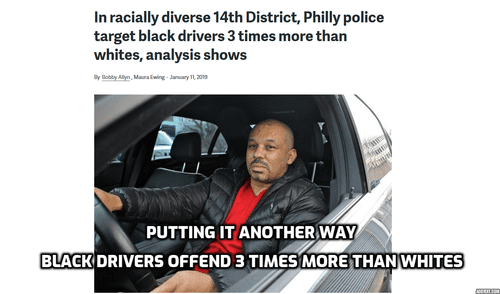


04/20/2019
Re: James Fulford’s article Black Privilege Is Ultimate Cause Of Minnesota Mall Atrocity
From: Colin Wright [Via Unz.com]
By James Fulford says in his recent article:
‘… In 2002, Heather Mac Donald wrote in City Journal about a New Jersey study that said black drivers speed twice as much as white drivers. …’
Somewhat irrelevantly, that reminds me: blacks never use their turn signals. Okay: when I first noticed this, I started watching, and I have to admit over a period of years I think I did notice one black actually use his turn signal.
The observation fascinates me: what exactly does it say about the attitude of blacks towards the world around them? After all, I signal: aside from disliking tickets, I want other drivers to be aware of my intentions, and I’d just as soon not cause mayhem as I career down the streets. Most other non-blacks signal as well: not invariably, but usually.
So why don’t blacks signal — ever?
By James Fulford writes: There’s not a lot of research on why blacks don’t use their turn signals. (Such research is … discouraged.) Instead there are studies on why they get stopped more than whites.
For example, the story
In racially diverse 14th District, Philly police target black drivers 3 times more than whites, analysis shows, by Bobby Allyn Maura Ewing, Whyy.org, January 11, 2019
might just as easily have been headed "In racially diverse 14th District, black drivers offend 3 times more than whites". That seems entirely reasonable.
The same applies to a story that says
… failure to signal is often a handy tool for police to establish a valid reason to pull over a vehicle that they feel is suspicious. A signal violation is a primary offense — one that legally allows a traffic stop. Police might suspect a driver is drunk, transporting drugs or guilty of any number of other infractions. (See "Do you look like you have insurance? Opens a New Window. ")
That practice can be controversial.
Florida attorney Shane Fischer says that in his experience, failure-to-signal tickets are much more common in poor, predominantly African-American or Latino communities.
Data presented in Chavez v. Illinois State Police, a class-action lawsuit, showed that Hispanics, while less than 3 percent of the driving-age population in one district, made up 25 percent of drivers pulled over in discretionary stops for offenses such as failure to signal a lane change.
Once again, that seems entirely reasonable. The lawyers and lawmakers have a fantasy that everyone acts exactly the same, and if police give more tickets to one group, that’s profiling.